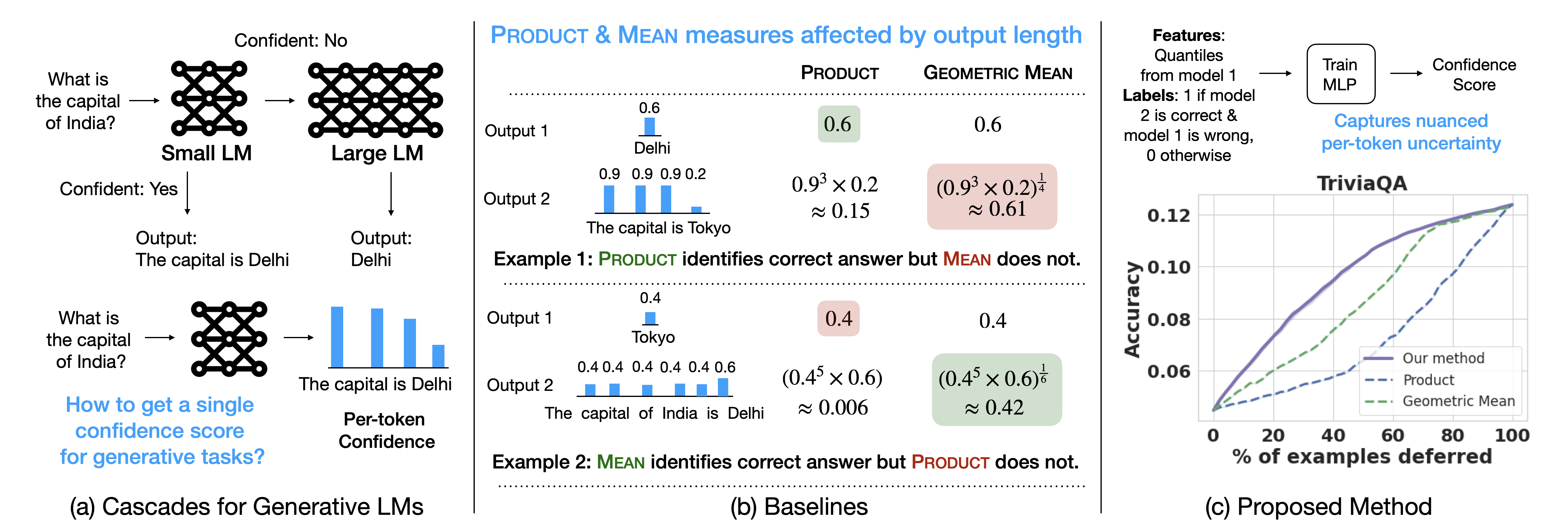Can LLMs get help from other LLMs without revealing private information?
2404.01041

0
0

Abstract
Cascades are a common type of machine learning systems in which a large, remote model can be queried if a local model is not able to accurately label a user's data by itself. Serving stacks for large language models (LLMs) increasingly use cascades due to their ability to preserve task performance while dramatically reducing inference costs. However, applying cascade systems in situations where the local model has access to sensitive data constitutes a significant privacy risk for users since such data could be forwarded to the remote model. In this work, we show the feasibility of applying cascade systems in such setups by equipping the local model with privacy-preserving techniques that reduce the risk of leaking private information when querying the remote model. To quantify information leakage in such setups, we introduce two privacy measures. We then propose a system that leverages the recently introduced social learning paradigm in which LLMs collaboratively learn from each other by exchanging natural language. Using this paradigm, we demonstrate on several datasets that our methods minimize the privacy loss while at the same time improving task performance compared to a non-cascade baseline.
Get summaries of the top AI research delivered straight to your inbox:
Overview
- This paper explores a novel approach that allows large language models (LLMs) to collaborate with each other without revealing private information.
- The authors propose a technique called "private machine learning" that enables LLMs to benefit from the knowledge and capabilities of other models while preserving the confidentiality of their own data and parameters.
- The paper outlines the problem setting, the technical details of the proposed solution, and an evaluation of its performance and privacy guarantees.
Plain English Explanation
Large language models like GPT-3 and BERT have shown remarkable capabilities in a wide range of tasks, from text generation to question answering. However, these models are typically trained on large datasets that may contain sensitive or private information. The authors recognize that in many real-world scenarios, organizations or individuals may be hesitant to share their private data with others, even if it could help improve the performance of their own language models.
The key idea behind the authors' approach is to enable LLMs to learn from each other without directly sharing their underlying data or model parameters. Instead, the models engage in a secure collaborative learning process, where they exchange only the necessary information to improve their performance, while keeping their private details hidden. This is achieved through the use of advanced cryptographic techniques and privacy-preserving machine learning algorithms.
Imagine you have a specialized medical language model that has been trained on a large corpus of patient records. You want to enhance its capabilities, but you can't share the patient data due to privacy concerns. Using the proposed method, you could collaborate with a general-purpose language model without revealing any of the sensitive information in your dataset. The two models would engage in a secure exchange, and your medical model would benefit from the general knowledge of the other model, while maintaining the confidentiality of your patients' data.
Technical Explanation
The paper introduces a framework called "Private Machine Learning for Language Models" (PML-LM), which allows LLMs to collaborate without exposing their private information. The core of the approach is a secure multi-party computation (MPC) protocol that enables the models to perform joint computations on their respective datasets and parameters, without directly sharing the underlying data.
The authors first define the problem setting, where multiple LLMs, each with their own private dataset and model parameters, aim to collectively improve their performance through collaboration. They then present the technical details of the PML-LM protocol, which consists of three main steps:
- Model Initialization: The LLMs initialize their own models and share a public set of model parameters, while keeping their private parameters hidden.
- Secure Collaborative Training: The LLMs engage in a secure multi-party training process, where they exchange only the necessary updates to their model parameters, without revealing their private data or model details.
- Private Inference: Once the collaborative training is complete, the LLMs can use the jointly-improved model to perform private inferences on their own data, without exposing any private information.
The authors evaluate the performance of PML-LM on several language modeling benchmarks, demonstrating that the collaboratively-trained models achieve comparable or even better results than standalone models, while providing strong privacy guarantees. They also analyze the computational and communication overhead of the protocol, showing that it can be efficiently implemented in practical settings.
Critical Analysis
The paper presents a compelling solution to the challenge of enabling LLMs to benefit from collaborative learning without compromising privacy. The authors' use of secure multi-party computation techniques is well-justified and the evaluation results are encouraging.
However, the paper does not address some potential limitations and areas for future research. For instance, the authors do not discuss the scalability of the approach as the number of collaborating LLMs grows, or the impact of potential adversarial attacks on the secure protocol. Additionally, the paper focuses on language modeling tasks, and it would be valuable to explore the applicability of the PML-LM framework to other domains, such as computer vision or speech recognition.
Furthermore, the authors could have delved deeper into the practical implications and real-world use cases of their approach. Providing more concrete examples of how PML-LM could be leveraged by different organizations or individuals would help readers better understand the significance and potential impact of the research.
Conclusion
The paper presents a novel and promising approach to enable collaborative learning among large language models while preserving the privacy of their underlying data and parameters. The PML-LM framework, which leverages secure multi-party computation techniques, allows LLMs to collectively improve their performance without revealing sensitive information.
This research addresses an important challenge in the field of machine learning, where the benefits of collaboration must be balanced against the need to protect private data. The authors' work demonstrates that it is possible to strike this balance, opening up new possibilities for LLMs to learn from each other and collectively advance the state of the art in natural language processing.
As large language models become increasingly prominent in a wide range of applications, the ability to collaborate securely will be crucial for unlocking their full potential while respecting privacy concerns. The PML-LM framework represents a significant step towards realizing this vision, and the authors' work lays the groundwork for further research and development in this critically important area.
This summary was produced with help from an AI and may contain inaccuracies - check out the links to read the original source documents!
Related Papers

Language Model Cascades: Token-level uncertainty and beyond
Neha Gupta, Harikrishna Narasimhan, Wittawat Jitkrittum, Ankit Singh Rawat, Aditya Krishna Menon, Sanjiv Kumar

0
0
Recent advances in language models (LMs) have led to significant improvements in quality on complex NLP tasks, but at the expense of increased inference costs. Cascading offers a simple strategy to achieve more favorable cost-quality tradeoffs: here, a small model is invoked for most easy instances, while a few hard instances are deferred to the large model. While the principles underpinning cascading are well-studied for classification tasks - with deferral based on predicted class uncertainty favored theoretically and practically - a similar understanding is lacking for generative LM tasks. In this work, we initiate a systematic study of deferral rules for LM cascades. We begin by examining the natural extension of predicted class uncertainty to generative LM tasks, namely, the predicted sequence uncertainty. We show that this measure suffers from the length bias problem, either over- or under-emphasizing outputs based on their lengths. This is because LMs produce a sequence of uncertainty values, one for each output token; and moreover, the number of output tokens is variable across examples. To mitigate this issue, we propose to exploit the richer token-level uncertainty information implicit in generative LMs. We argue that naive predicted sequence uncertainty corresponds to a simple aggregation of these uncertainties. By contrast, we show that incorporating token-level uncertainty through learned post-hoc deferral rules can significantly outperform such simple aggregation strategies, via experiments on a range of natural language benchmarks with FLAN-T5 models. We further show that incorporating embeddings from the smaller model and intermediate layers of the larger model can give an additional boost in the overall cost-quality tradeoff.
4/17/2024

Locally Differentially Private In-Context Learning
Chunyan Zheng, Keke Sun, Wenhao Zhao, Haibo Zhou, Lixin Jiang, Shaoyang Song, Chunlai Zhou

0
0
Large pretrained language models (LLMs) have shown surprising In-Context Learning (ICL) ability. An important application in deploying large language models is to augment LLMs with a private database for some specific task. The main problem with this promising commercial use is that LLMs have been shown to memorize their training data and their prompt data are vulnerable to membership inference attacks (MIA) and prompt leaking attacks. In order to deal with this problem, we treat LLMs as untrusted in privacy and propose a locally differentially private framework of in-context learning(LDP-ICL) in the settings where labels are sensitive. Considering the mechanisms of in-context learning in Transformers by gradient descent, we provide an analysis of the trade-off between privacy and utility in such LDP-ICL for classification. Moreover, we apply LDP-ICL to the discrete distribution estimation problem. In the end, we perform several experiments to demonstrate our analysis results.
5/9/2024

It's a Fair Game, or Is It? Examining How Users Navigate Disclosure Risks and Benefits When Using LLM-Based Conversational Agents
Zhiping Zhang, Michelle Jia, Hao-Ping Lee, Bingsheng Yao, Sauvik Das, Ada Lerner, Dakuo Wang, Tianshi Li

0
0
The widespread use of Large Language Model (LLM)-based conversational agents (CAs), especially in high-stakes domains, raises many privacy concerns. Building ethical LLM-based CAs that respect user privacy requires an in-depth understanding of the privacy risks that concern users the most. However, existing research, primarily model-centered, does not provide insight into users' perspectives. To bridge this gap, we analyzed sensitive disclosures in real-world ChatGPT conversations and conducted semi-structured interviews with 19 LLM-based CA users. We found that users are constantly faced with trade-offs between privacy, utility, and convenience when using LLM-based CAs. However, users' erroneous mental models and the dark patterns in system design limited their awareness and comprehension of the privacy risks. Additionally, the human-like interactions encouraged more sensitive disclosures, which complicated users' ability to navigate the trade-offs. We discuss practical design guidelines and the needs for paradigm shifts to protect the privacy of LLM-based CA users.
4/3/2024
💬
Apprentices to Research Assistants: Advancing Research with Large Language Models
M. Namvarpour, A. Razi

0
0
Large Language Models (LLMs) have emerged as powerful tools in various research domains. This article examines their potential through a literature review and firsthand experimentation. While LLMs offer benefits like cost-effectiveness and efficiency, challenges such as prompt tuning, biases, and subjectivity must be addressed. The study presents insights from experiments utilizing LLMs for qualitative analysis, highlighting successes and limitations. Additionally, it discusses strategies for mitigating challenges, such as prompt optimization techniques and leveraging human expertise. This study aligns with the 'LLMs as Research Tools' workshop's focus on integrating LLMs into HCI data work critically and ethically. By addressing both opportunities and challenges, our work contributes to the ongoing dialogue on their responsible application in research.
4/10/2024